ba1 [bá] vb. to watch; to guard: ghá
ba ẹre ne ẹ ghẹ lẹ fua ― “keep watch-
ing it so that it does not run off”.

ba2 [bá] vb. 1. to do something steal-
%%

thily: te ọ ba la owa ẹre i ma na họn
― “he sneaked into the house, and
that is why I did not hear him”. 2.
to walk lifelessly, as if from weak-
ness.
$Page 013$
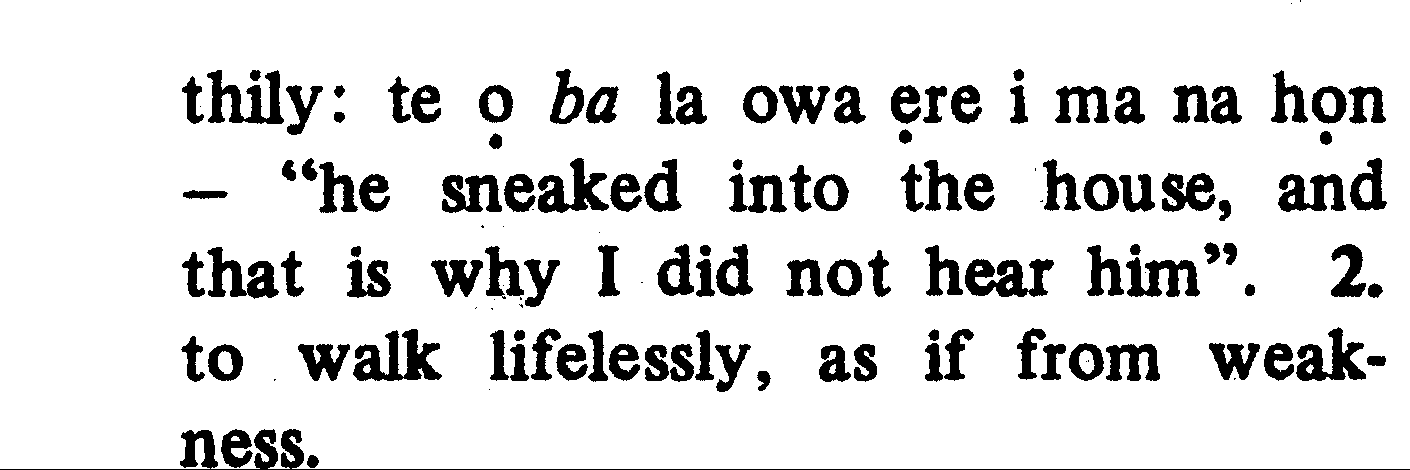
ba3 [bá] aux. to pretend to be doing
something; to fake: Te ọ ba viẹ ― “He
is pretending to cry” (also ma).

baa1 [bàá] vb. 1. to be red or orange;
2. to be brightly coloured. 3. to shine,
e.g. of the moon; to be lit (of lamps &
other sources of light).

baa2 [bàá] vb. 1. to implant a straight
object into something, mostly into the
ground; to thrust: ọ baa erhan ye
otọ ― “he stuck a stick into the
ground”. 2. (idiomatic) (with ohoghoi):
to pin on, to attribute to: ọ baa mwẹn
ohoghoi ― “he pinned lies on me;
i.e., he told lies against me.”
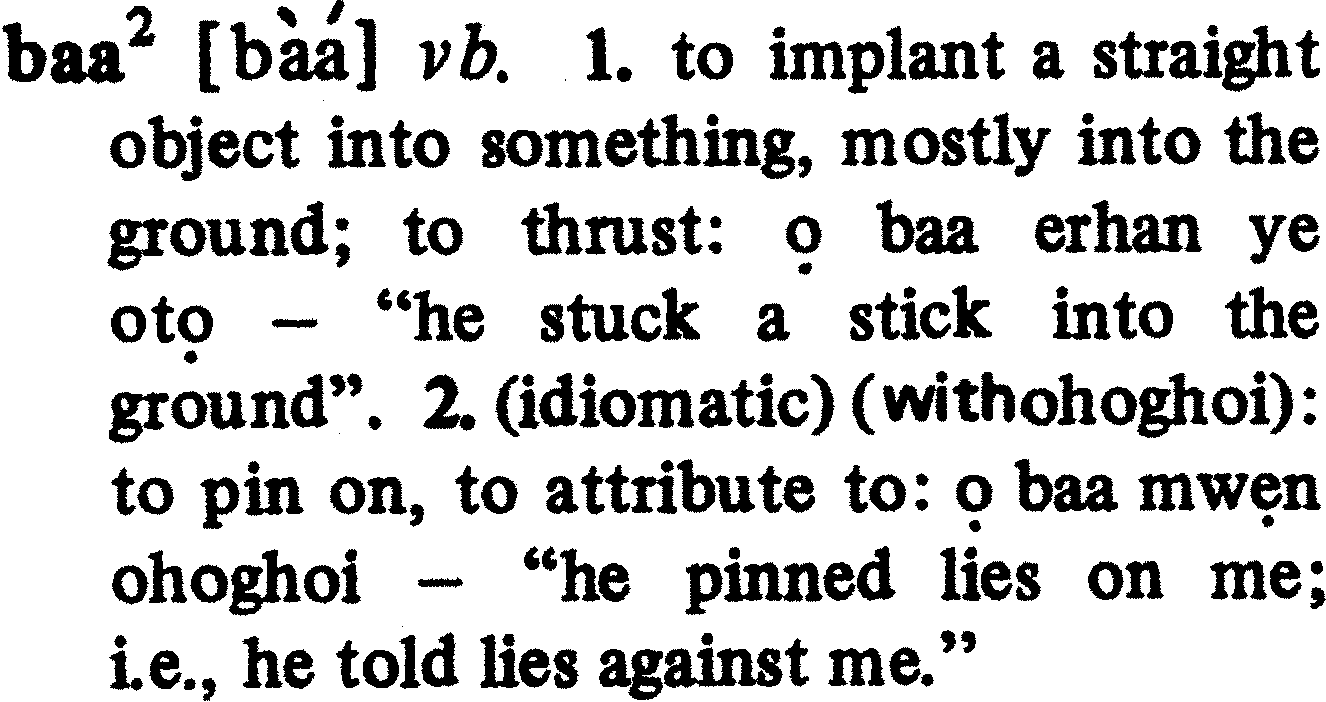
baa3 [bàá] vb. to be difficult, arduous.

baa4 [bàá] vb. 1. (with ẹmwẹn) to
twist; to alter: ọ baa mwẹn ẹmwẹn ―
“he twisted my words: he lied against
me”.

baa5 [bàá] vb. part. (usually with vbs.
such as rhie, mu, viọ, etc.) to add to:
rhie ọna baa ọni ― “take this to add
to that; i.e. add this to that”.

baa6 [bàá] adv. compltz. for the sake
of; because of: ọ gbee mwẹn baa
ẹmwẹn ruẹn ― “he beat me
because of your affair: he beat me
because of you.”

baan [bã̀ã́] vb. to abstain from; to give
up something; to stop doing something.

baba1 [bàbá] vb. plural or reiterative
sense of baa3 i.e. to implant several
objects or to implant the same object
repeatedly: ọ baba erhan lele otọ ―
“he stuck sticks along the ground”.

baba2 [bàbá] vb. reiterative sense of
ba1 above; i.e. to watch repeatedly;
to spy on continuously: gha baba ẹre
ne ọ ghẹ lẹ fua ― “keep watching it
%%

so that it does not run off.”

baba3 [bàbá] vb. to grope; to feel
about as one does in the dark.

ba igban [bàígbã̀] vb. (idiom) to pro-
claim a woman as the wife of the Ọba
of Benin: iran baa uvbi nii igban ―
“they declared that young woman
a wife of the Ọba.”
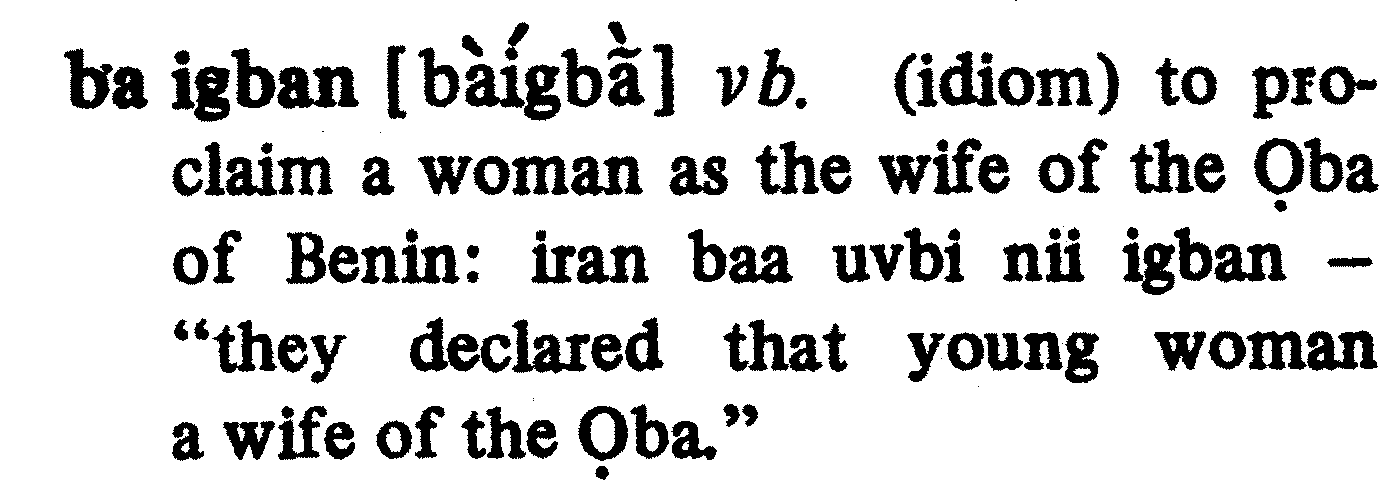
ba ku [bàkú] vb. 1. to make a mistake,
to miss; 2^.^ in the Christian sense ― to
transgress; to sin.

balọ1 [bàlɔ́] vb. to be painful; to hurt.

balọ2 [bàlɔ́] vb. 1. to scoop liquid with
a small container; 2. to spill; to pour
out.

ban [bã́] vb. 1. to peel off; 2. to se-
parate forcibly: ọ gha ban ikpakpa re
fua ― “he will peel the skin off”.

banbaan [bã́bã́ã̀] adv. immediately;
right now. (also: banbanna and
banbanbanban).

bannọ [bã̀nɔ̃́] vb. plural or reiterative
sense of ban: e.g. to peel off several
slices; or two or more people peel off
something.

bebe [bèbé] vb. 1. to be mischievously
overactive; troublesome (usually of
children): ọvbokhan na bebe gbe ―
“This child is too troublesome.” 2.
adventurous.

begbe [bègbé] vb. (< ba egbe) to be
self-protective; to be on one’s guard.

bẹbuu [bɛ̀búù] vb. child language ex-
pression meaning “to lie down”.

bẹẹ1 [bɛ̀ɛ́] vb. to slice: bẹẹ iyan nii
ye akhe ― “slice that yam into the
pot (and cook it)”.
$Page 014$

bẹẹ2 [bɛ̀ɛ́] vb. (with ọgọ) to tap (palm
wine); to collect and store away. (cf:
ọbọgọ; bọọgọ).

bẹbẹẹbẹ [bɛ́bɛ́ɛ́bɛ́] adj. (used with the
verb ye): very large extensive; nene
akhe ye bẹbẹẹbẹ ― “the pot is ex-
tremely large.”

bẹghe [bɛ̀ɣèé] vb. to see; to sight: I
bẹghe ẹre vbe ọ dee ― “I saw him as
he was approaching”. (cf: dẹghee).

bẹkun [bɛ̀kṹ] adv. 1. (usually with vbs
such as ru; bọ; re, etc.) ― incomplete-
ly: ọ bọ owa nii bẹkun serae ye evba ―
“he built that house half-way and
left it there”. 2. (usually with the vb.
hoo: “to look for”) abortively; un-
successfully: iran hoo ẹre bẹkun ―
“they searched for him unsuccessful-
ly; i.e. he is nowhere to be found”.
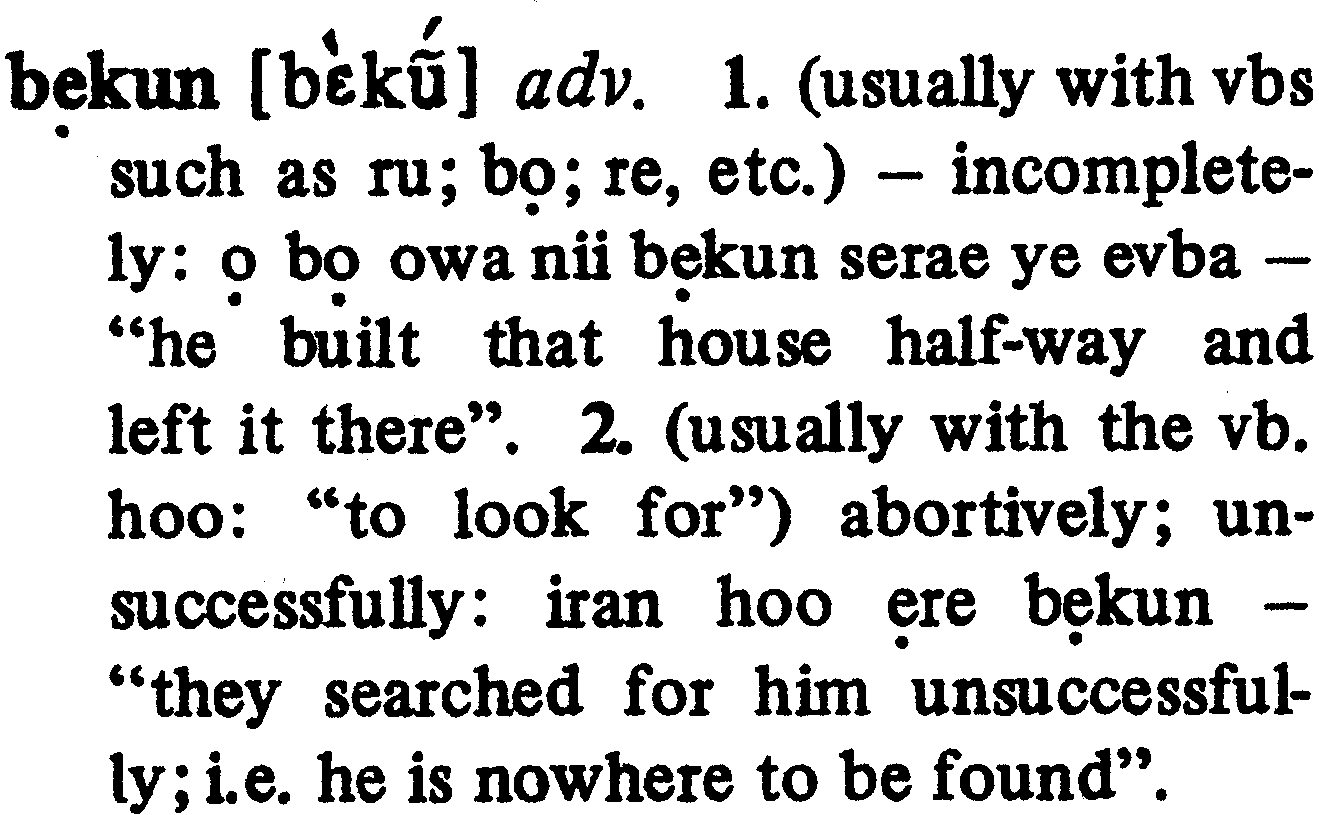
bẹlẹ [bɛ̀lɛ́] vb. plural reiterative sense
of bẹẹ1: to cut into several slices; or
for several people to engage in slicing.

bẹtẹ [bɛ̀tɛ̀] adj. (usually introduced
with the vb: ye) fat; stocky; chubby:
ovbi-ẹre ye bẹtẹ ― “her child is
chubby.”

bẹtẹbẹtẹ [bɛ̀tɛ̀bɛ̀tɛ̀] adj. pl. sense of
bẹtẹ: ivbi-ẹre ye bẹtẹbẹtẹ ― “her
children are all chubby.”

bẹtẹẹ [bɛ́tɛ́ɛ́] adj. (usually introduced
with the vb. ye) very large; expansive:
eki ni ye bẹtẹẹ ― “that market is very
large.”

bẹmwẹn [bɛ́ɱɛ̃̀] vb. to stammer.

bi1 [bí] vb. 1. to shove, to push: bi
ẹre hin odẹ rre ― “push it out of the
way”. 2. (idiomatic) to be moved by;
to be of concern to; (usually occurs
in negative clauses): ẹmwẹn ọnrẹn ma
bi mwẹn ― “His affairs are not of any
%%
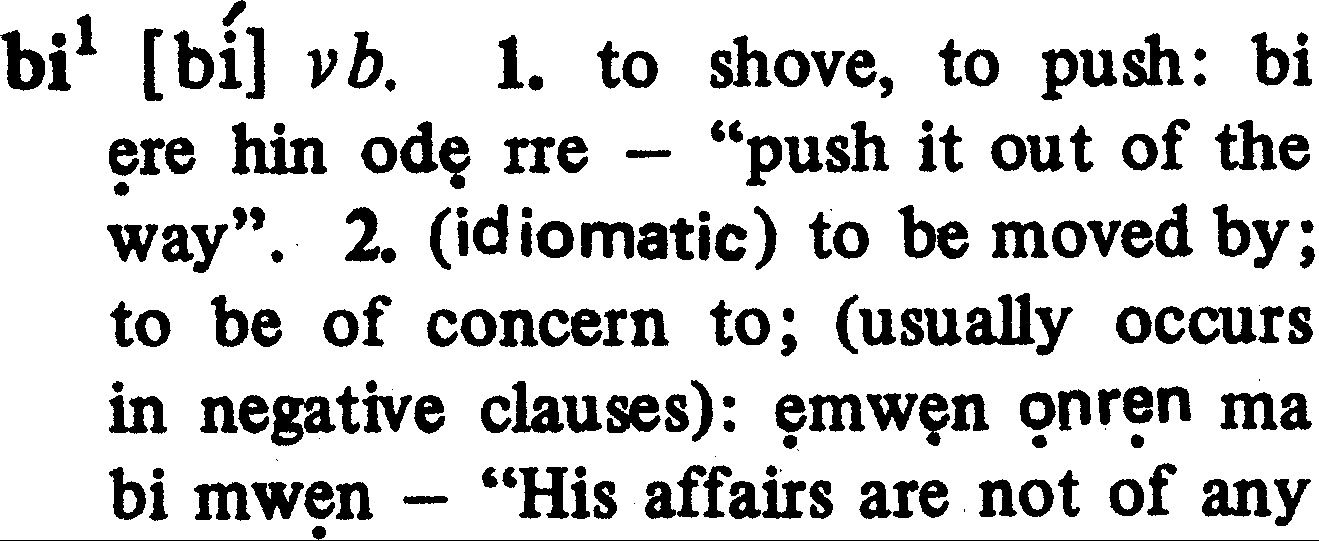
concern to me”. (cf. kaan).

bi2 [bí] vb. to vomit: ọ bii ukhunmwun
nii hia kua ― “He vomitted all that
medicine out”. (cf. kpa).

bi3 [bí] vb. 1. to be dark in shade or
colour: ukpọn naa ẹre ọ bi sẹ ọnii ―
“This cloth is darker than that one.”
2. (with amẹ) to threaten; to be
imminent: amẹ bi ― “Rain is threaten-
ing” (that is, there are dark clouds
in the sky). 3. (with certain fruits,
such as orunmwun; orhurhu; etc.):
to be ripe; to be ready-to-eat:
orunmwun naa bi nẹ ― “This pear
is ripe.”
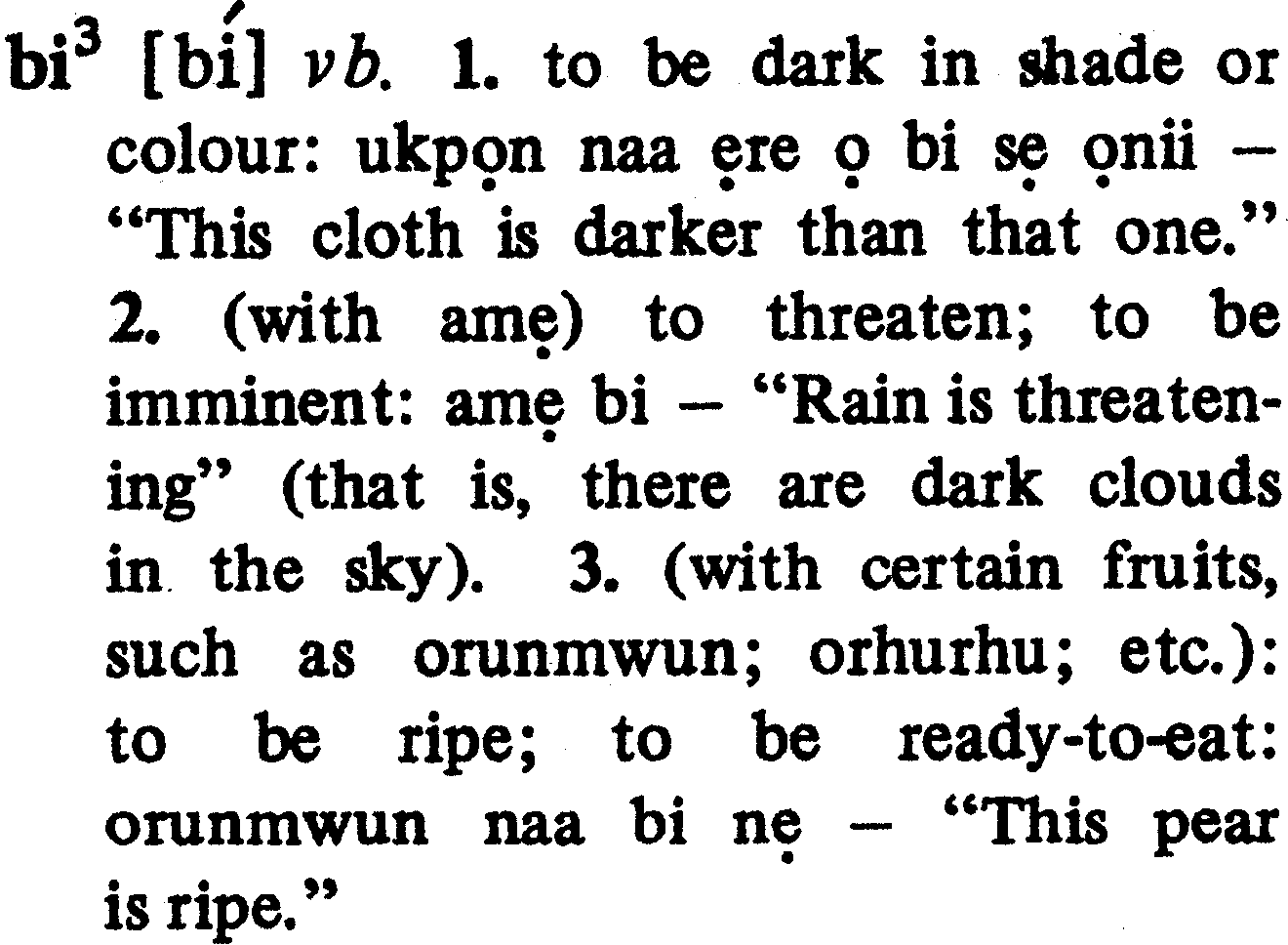
bian [bĩ̀ã́] vb. to slice off a strip.

bibi1 [bìbí] vb. to grope; to roam aim-
lessly (cf. bibi-odẹ).

bibi2 [bìbí] vb. to be foolish; to be
stupid: ú bibi ― “you are stupid.”

bibiode [bỳbiòdɛ́] vb. to get lost; to
go astray (bibi (vb) + odẹ ― road).

biegbe [byègbé] vb. to give way; to
dock.

biẹ [byɛ́] vb. 1. to give birth; 2. to have
children (as opposed to being barren);
3. to have off-shoots (with plants such
as iyan or igari).

bigọọ [bìgɔ̀ɔ́] vb. to be crooked; curved
or bent; not straight: erhan na bigọọ
― “This tree is crooked.”

bigọbigọbigọ [bígɔ́bìgɔ̀bígɔ́] adj. (us-
ually introduced by the vb. ye): very
crooked.

bigbe [bìgbé] vb. to shut; to close.

bii [bìí] vb. to stab; to jab with a
pointed object: ọ ya opia bii ẹre ―
$Page 015$

“He stabbed him with a knife.”

bobo [bòbó] vb. to run anxiously back
and forth (like a hen about to lay an
egg); to wander aimlessly.

bodẹ [bòdɛ́] vb. to stand guard (ba1 +
odẹ ― road).

bolo [bòló] vb. to peel (skin), to strip
off: ọ bolo alimo ― “he peeled the
orange.”

bọ1 [bɔ́] vb. to build; construct: ọ bọ
egedege: “he built a storey-house.”

bọ2 [bɔ́] vb. 1. to predict; to tell one’s
fortune: ọbo bọ mẹ ― “the native-
doctor told me my fortune.” 2. to
consult a fortune-teller or native
doctor: i khian ya bọ yọ ― “I am
going to consult a native-doctor on
the matter.”
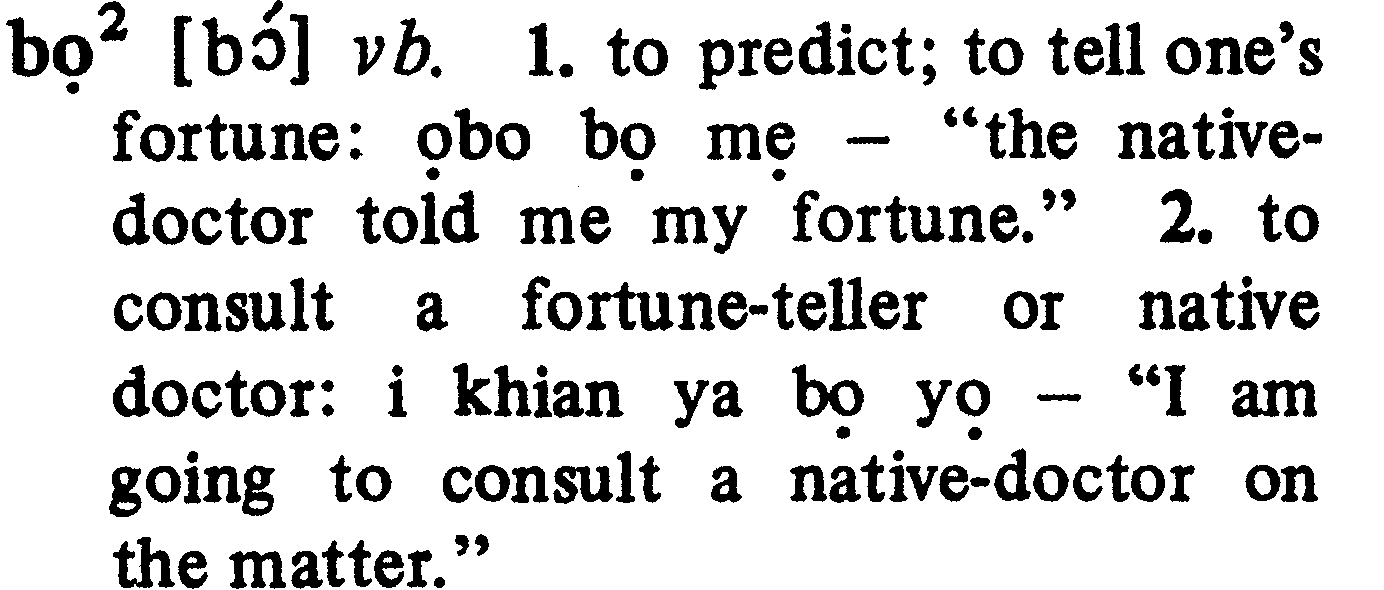
bọ3 [bɔ́] vb. to be favourable to; to be
good for (usually in proper names
such as Isibọ; Edobọ; etc.).

bọlọzọ [bɔ̀lɔ̀zɔ̀] adj. (introduced with
the vb. ye) chubby; pleasingly fat and
healthy-looking: ọmọ ni ye bọlọzọ ―
“that child looks nice and chubby.”

bọnmwẹn1 [bɔ̃̀ɱɛ̃] vb. 1. to drop in
small pieces, or granular form; to flake
off: iku ehẹn esọ bonmwẹn kua ―
“some small pieces flaked off from
the fish.” 2. to winnow. 3. to shake
off dust or dirt from a surface:
bonmwẹn aga nii u ke tota yọ ― “dust
that chair before you sit on it.”
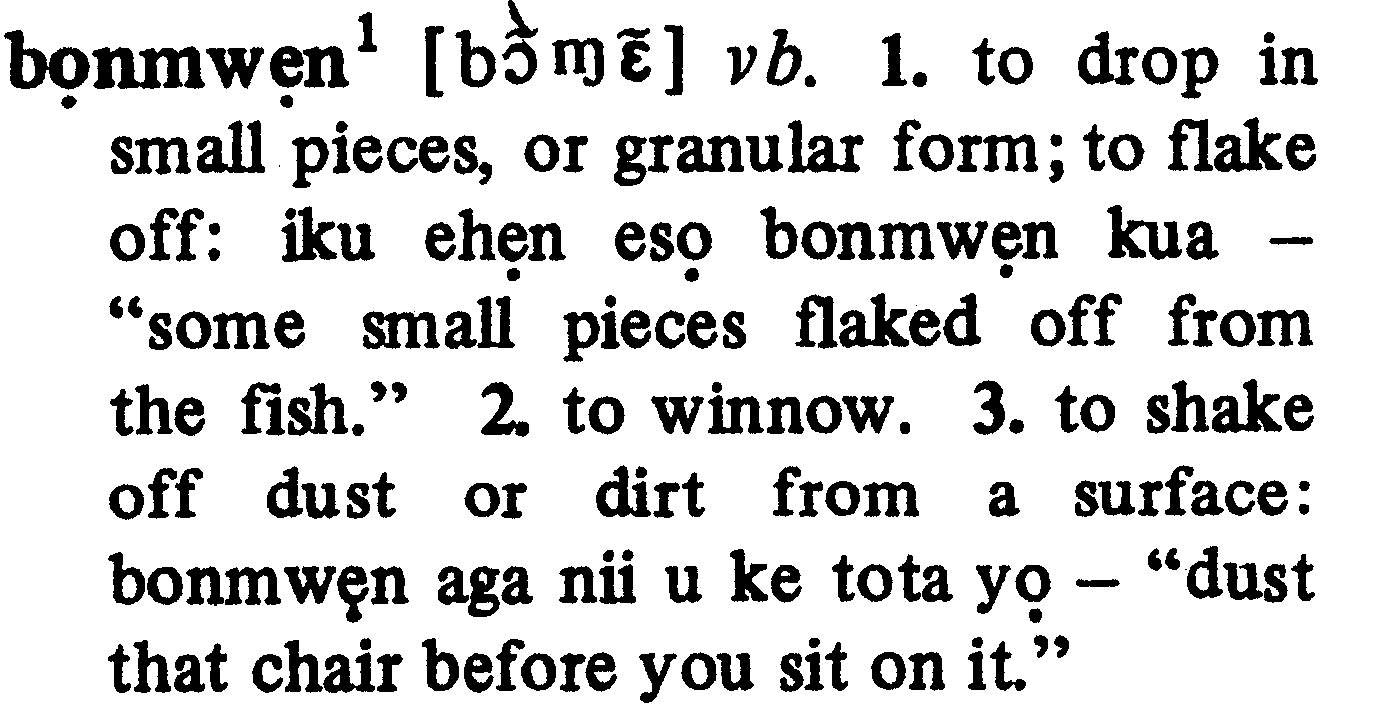
bọnmwẹn2 [bɔ̃̀ɱɛ̃́] vb. (usually with
verbs such as rhie, mu, kpaọ, dee,
etc.) to do swiftly; to do briskly; to
whisk off: ọ bonmwẹn kpao ― “She
left briskly”.
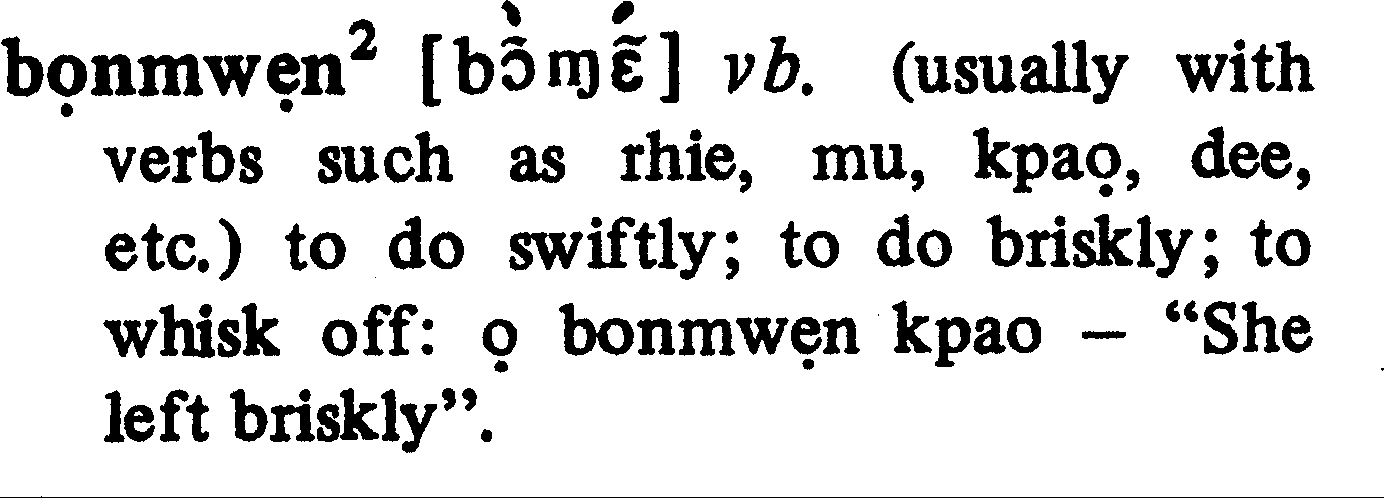
bọọ [bɔ̀ɔ́] vb. to console; to cheer up
%%

(usually a child who has been crying).

bọọn [bɔ̃̀ɔ̃́] vb. (of wearing apparel) to
lift, to raise up: bọọn ukpọn ― “to
raise up cloth (thereby revealing what
lies below)”^.

bọọzi [bɔ̀ɔ̀zì] adj. (usually introduced
with the vb. ye) big and long; larger
than normal size.

buan [bũ̀ã́] adv. sufficiently; in more
than enough quantity or value: ọ
winna buan ― “he worked sufficiently
or hard enough.”

bubu [bùbú] vb. 1. (usually with verbs
like kpaegbe; tota; kpao, etc.); to
move in an awkwardly brisk manner:
ọ bubuu kpaegbe: “he got up in an
awkwardly brisk manner.” 2. to be
awkward; clumsy.
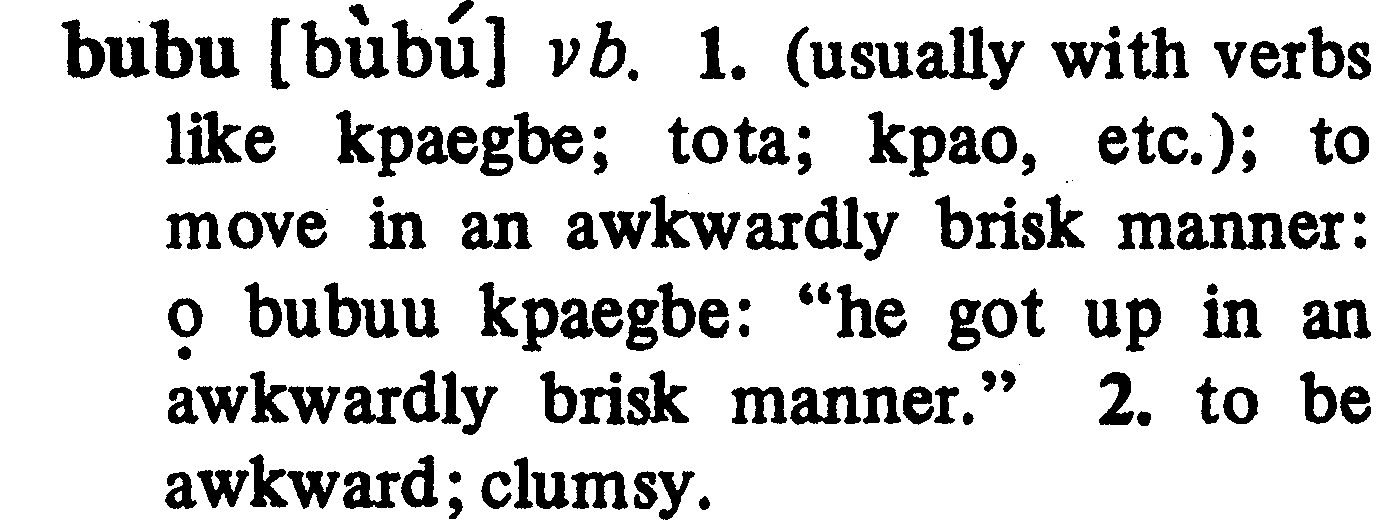
bue [bùé] vb. to stay long; to linger:
ghẹ bue vbe ẹki-o ― “don’t linger at
the market.” iran buere ― “they
stayed long”.

bukpẹ [búkpɛ̀] excl. formula of thanks
expressed by females to their elders
after a meal; it is also used as a greet-
ing to an older person who sneezes.

bun [bṹ] vb. 1. to be plentiful; to be
numerous: ẹvbo bun vbe odọọ:
“people are plentiful over there”^. 2.
vb. (usually with the adv. gbe) to be
much with: iku bun ẹnrẹn gbe: “he
is too fond of playing ― he plays too
much.”
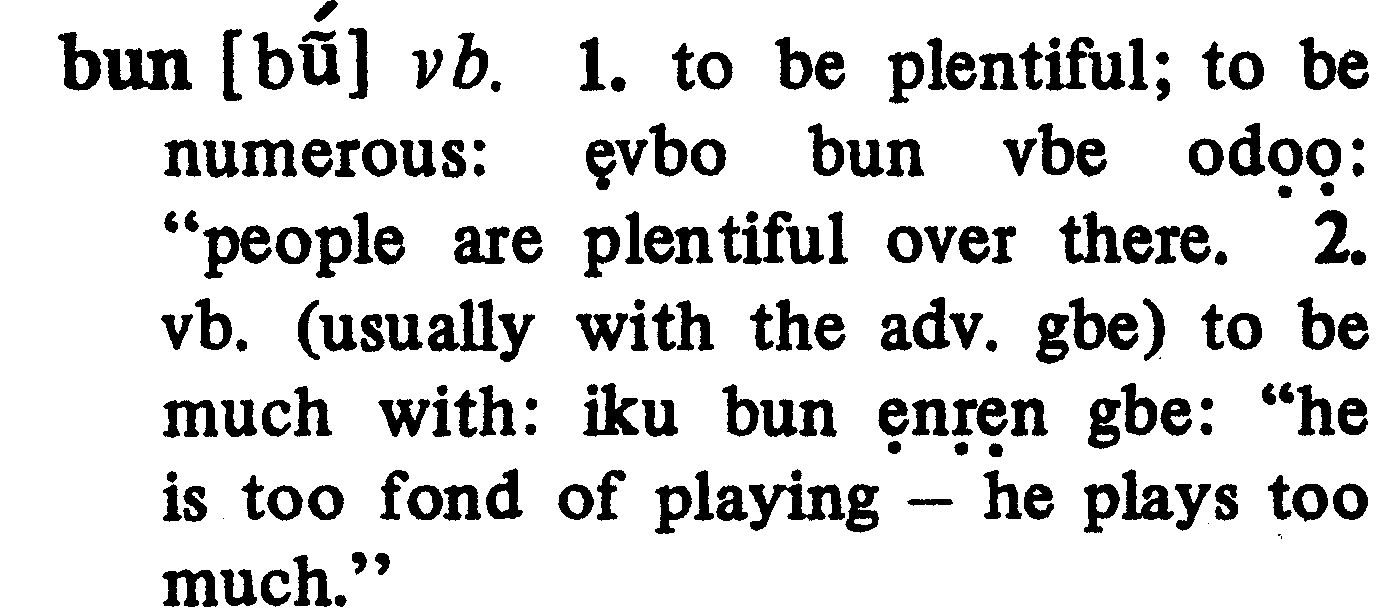
bunnọ [bũ̀nɔ̃́] vb. plural or reiterative
sense of buun: aberhan bunnọ kue
otọ ― “Tree branches have broken
off on the ground”.

buu1 [bùú] vb. 1. to go toward; to
approach something/somebody; to
meet or join: Ọ buu erhae ― “He
$Page 016$

went to meet his father.” 2. to ap-
proximate or approach in size or
value: ọna buu ọnii ― “This one
approaches that one in value”. 3. to
deposit money toward; to make a
down-payment on.
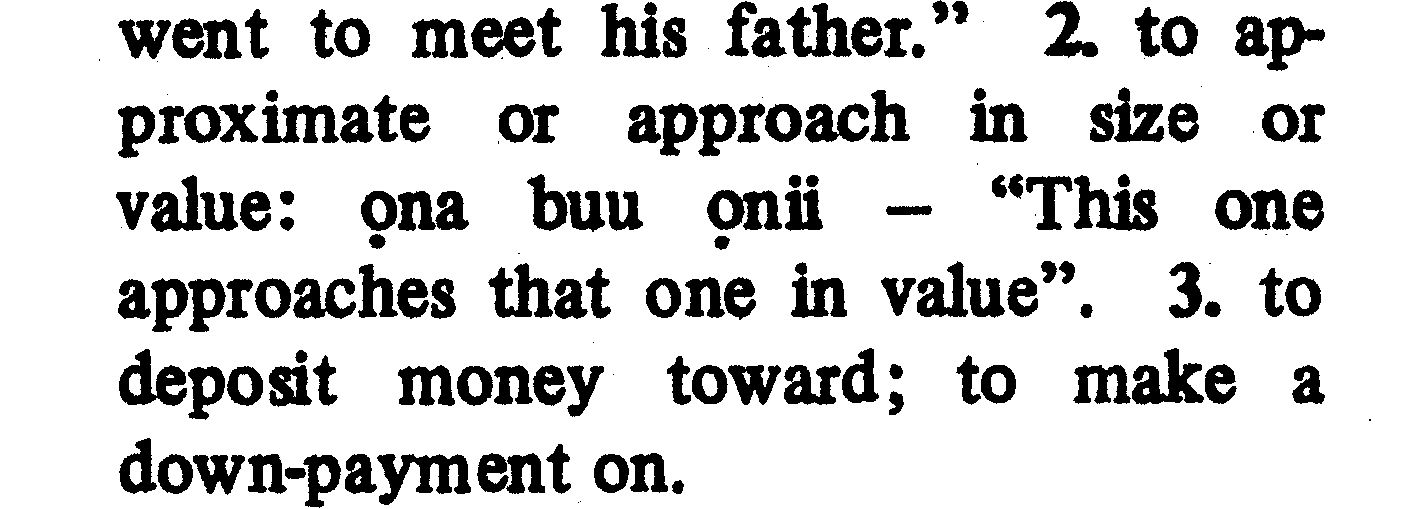
buu2 [bùú] vb. 1. to settle (e.g. a case):
Ọ buu ohiẹn ne iran ― “He settled the
case for them.” 2. to decide on
something; to fix (e.g. a date): ọ buu
ẹdẹ ne iran ― “He fixed a date for
them (i.e. He gave them an appoint-
%%
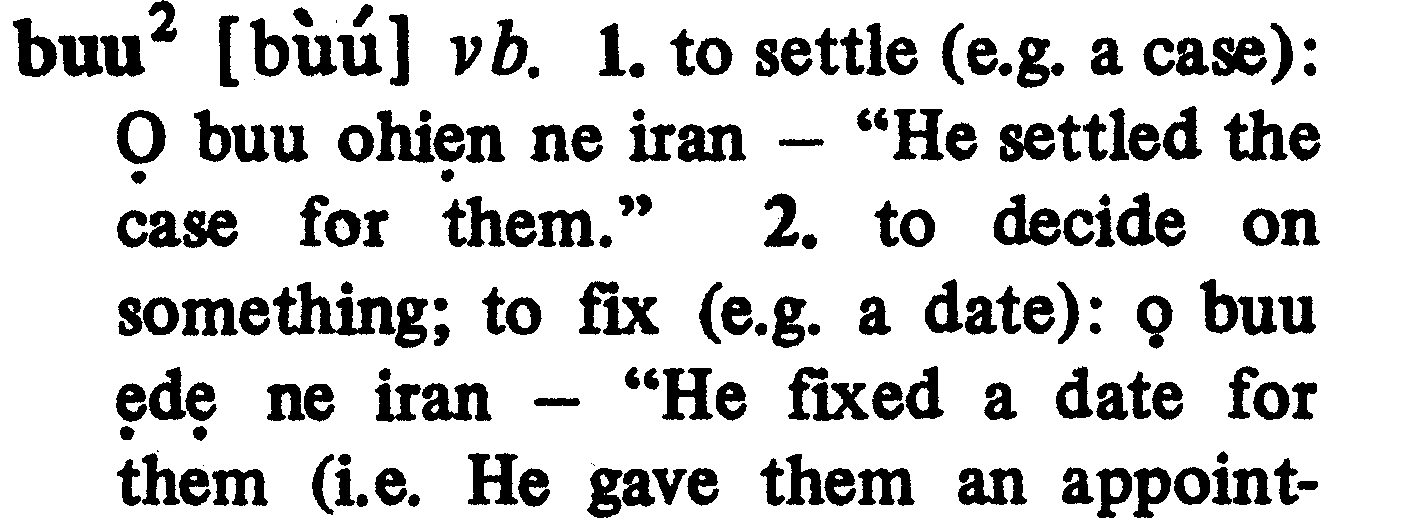
ment).”

buu3 [bùú] vb. 1. to found; to est-
ablish: Ọ kpẹre ne a ghi buu ẹvbo nii ―
It is a long time since that town was
founded. 2. to assemble for a meeting;
to meet as a group.
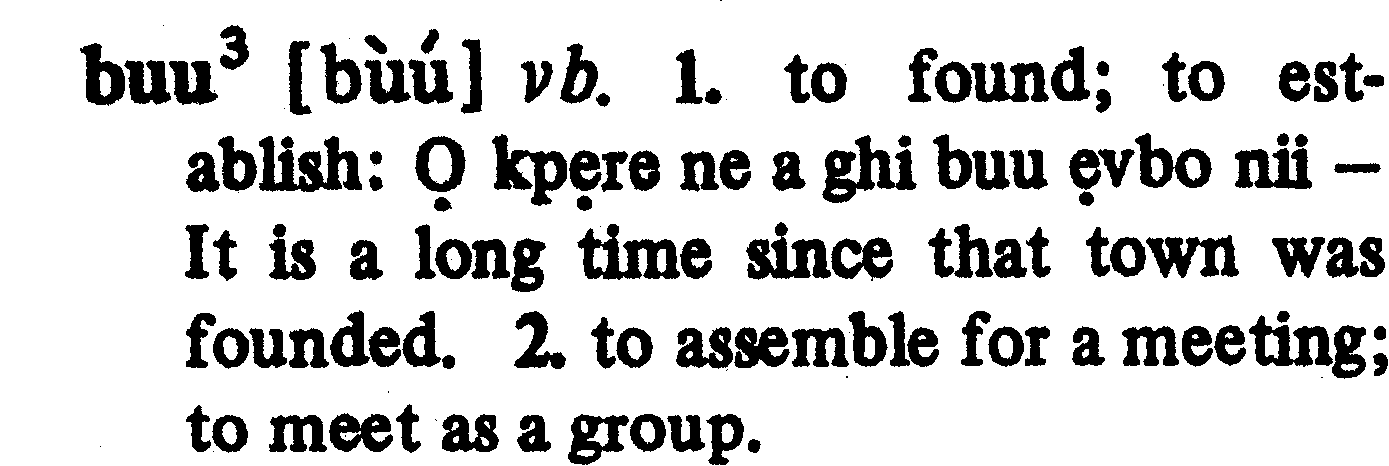
buun1 [bũ̀ṹ] vb. to break; to snap.

buun2 [bũ̀ṹ] vb. to confess to adultery
by a woman.
